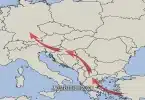With ancestors with lines that have been in the United States for a long time, you will find one of two things. One, they came to the east coast of the United States and stayed there, or two, they landed in the east and moved west. If you are researching ancestors with lines that went west, you will gradually move back east the farther you go back in time. It has to be this way because there were only thirteen original colonies in North America, and they were all on the east coast. Our earliest immigrant ancestors always came to the east first, except in the rare instances of French trappers or Spanish missionaries who may have gone up and into central Canada, or out west.
Whether you find your ancestors moved west or stayed east, one thing we usually don’t take the time to consider as genealogists is why they are where we find them. It’s actually a genealogically valid question, and one we should look at with great consideration. We tend to just move from one record to the other, and record what we find without examining it. It just seems natural to us that our ancestors are found further east the more we go back in time.
However, no one moves without a reason, and there is usually an equally valid reason for the place they move to. Why did they move, and why did they choose that location? If we take the time to answer these questions, we will learn important details about our ancestors as human beings, making them more real to us, which should always be a genealogical goal. Discover more details about your ancestors’ lives by taking the time to consider why they are where they are when you find them.
Also, determining why our ancestors live where they do is beneficial to us, because it forces us to look at records we may not otherwise examine. This is particularly useful on difficult lines or brick wall lines. Those lines force us to closely look at every record that was ever created. Just by searching for and finding these records, we will learn things about our ancestors we never knew. And we will discover these interesting and important details because we bothered to look for the records that tell us why they moved to where they moved. We may also make some genealogical breakthroughs to new lines and new generations when doing this, too.
This type of research forces us to spend time on each generation, getting to know them, instead of just recording their basic vital statistic details and moving on to the next generation.
Again, there is always a reason why a family chooses to move somewhere. Take a look at the location where you find them, as opposed to where their parents lived before them. If it is in the same town, you know they probably stayed there because of close family ties. If it is somewhere far away, figure out why they struck out on their own to a place that was unfamiliar to them.
Did they have any relatives who moved there before them? There might have been job opportunities or open farming land available inexpensively, and the whole family might have eventually moved there in small groups, following the ones who led the way.
If they are living somewhere on their own, or just with their spouse and children, away from other family members, there has to be a compelling reason why. Did the spouse’s family move there first? If not, what was going on in the area at the time they moved there? What was going on in the place from which they moved? Maybe they were Revolutionary War soldiers who were granted bounty land for their service but had to move to a faraway location to farm and keep it. If they lived near the border of Canada, they may have been granted land there as a Canadian refugee after the war (for Canadians who supported the Revolutionary cause or former New Englanders who went looking for land, but who came back to help the war effort).
Did your ancestors arrive during a time of large numbers of immigrants? If they were immigrants, they may have gone far inland, toward the west, in search of fertile farming lands. Others would move to where their family who came before them moved. That is how we got such large communities of Norwegians in Minnesota and Irish in Pennsylvania.
Look into the history of the European settlement of the area where you discover any given ancestor. The written history of how and why the area was settled by Europeans may explain why your ancestor went there. Look at state and county history books for more information on the settlement of the area you’re investigating.
The history of the area may also explain why some families settled there for a while and then moved on to other places. You could discover why people arrived when they did, and where they may have gone when they left if you’re not sure. You might even learn what routes your ancestors took when they left a place, especially if you know where they were going.
Look at the towns along these routes, and look for records there. You may find records of marriages, deaths, and births for your ancestors in unusual places that you didn’t know they ever spent any time. However, lots of important life events happened while moving long distances for our pioneer and colonial ancestors. If you know someone was born in a place their family did not live, learning what route they took when they moved may explain it.
As you can see, learning why your ancestors lived in certain places when they lived there offers great insight into their personal lives, as well as their places in history. It is also an excellent technique for connecting one generation to another. Use it, and all kinds of wonderful new genealogical information will be revealed to you.
Free Lookups:
- English Settlers in Barbados
- English Settlers in Barbados, 1637-1800 International Records
- Maryland Settlers and Soldiers, 1700s-1800s
- Early Settlers of New York State, 1760-1942
- Early Alabama, Arkansas, & Mississippi Settlers, 1700s-1800s
- Early Louisiana Settlers, 1600s-1800s
- Early North Carolina Settlers, 1700s-1900s
- Maine and New Hampshire Settlers, 1600s-1900s
- Early West Virginia Settlers, 1600s-1900s
- Early Kentucky Settlers, 1700s-1800s
- Early South Carolina Settlers, 1600s-1800s
- Early Georgia Settlers, 1700s-1800s
- Early Texas Settlers, 1700s-1800s
- Early Tennessee Settlers, 1700s-1900s
- Early New England Settlers, 1600s-1800s
- Scotch-Irish Settlers in America, 1500s-1800s
- Ontario and Nova Scotia Settlers, 1790-1860






